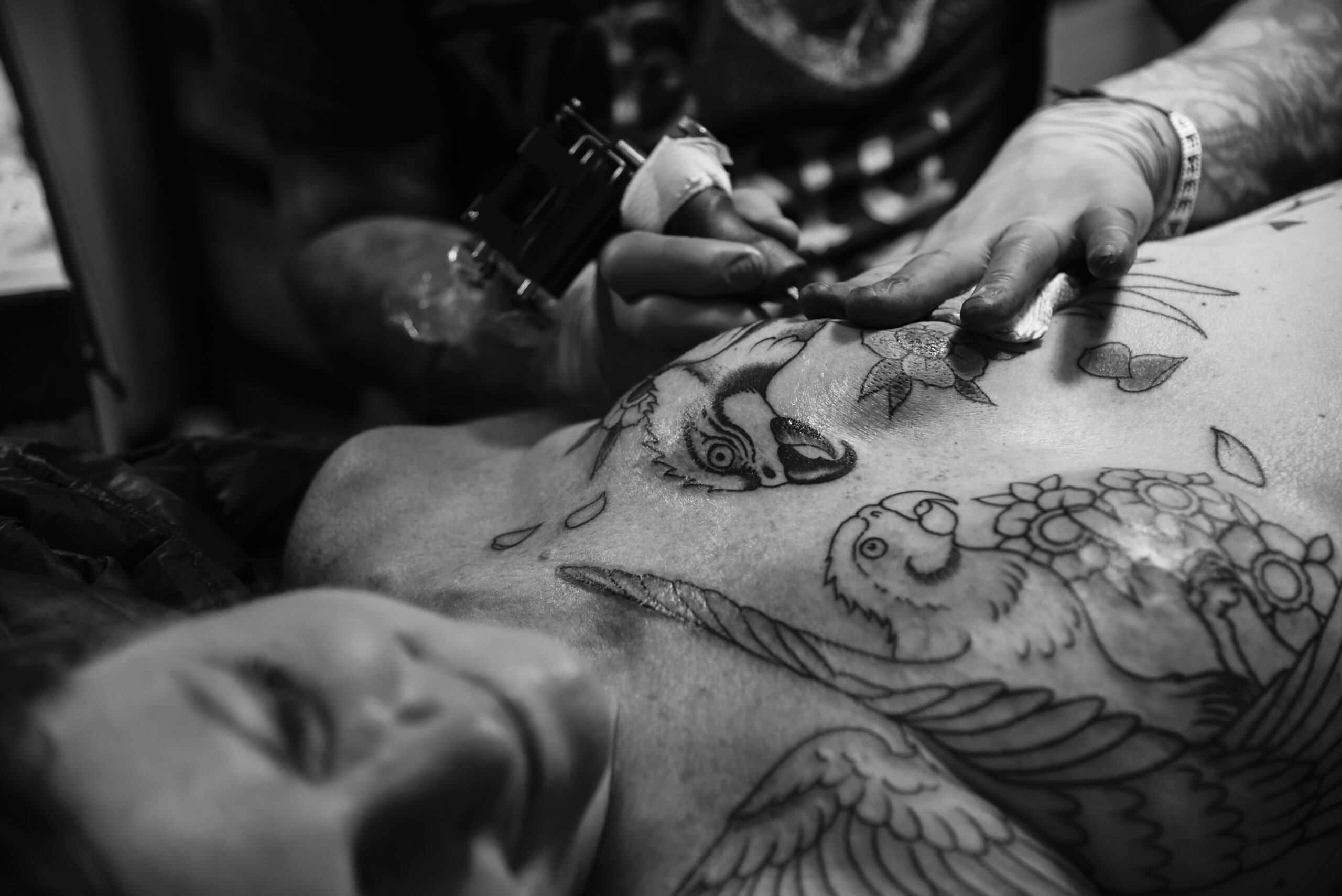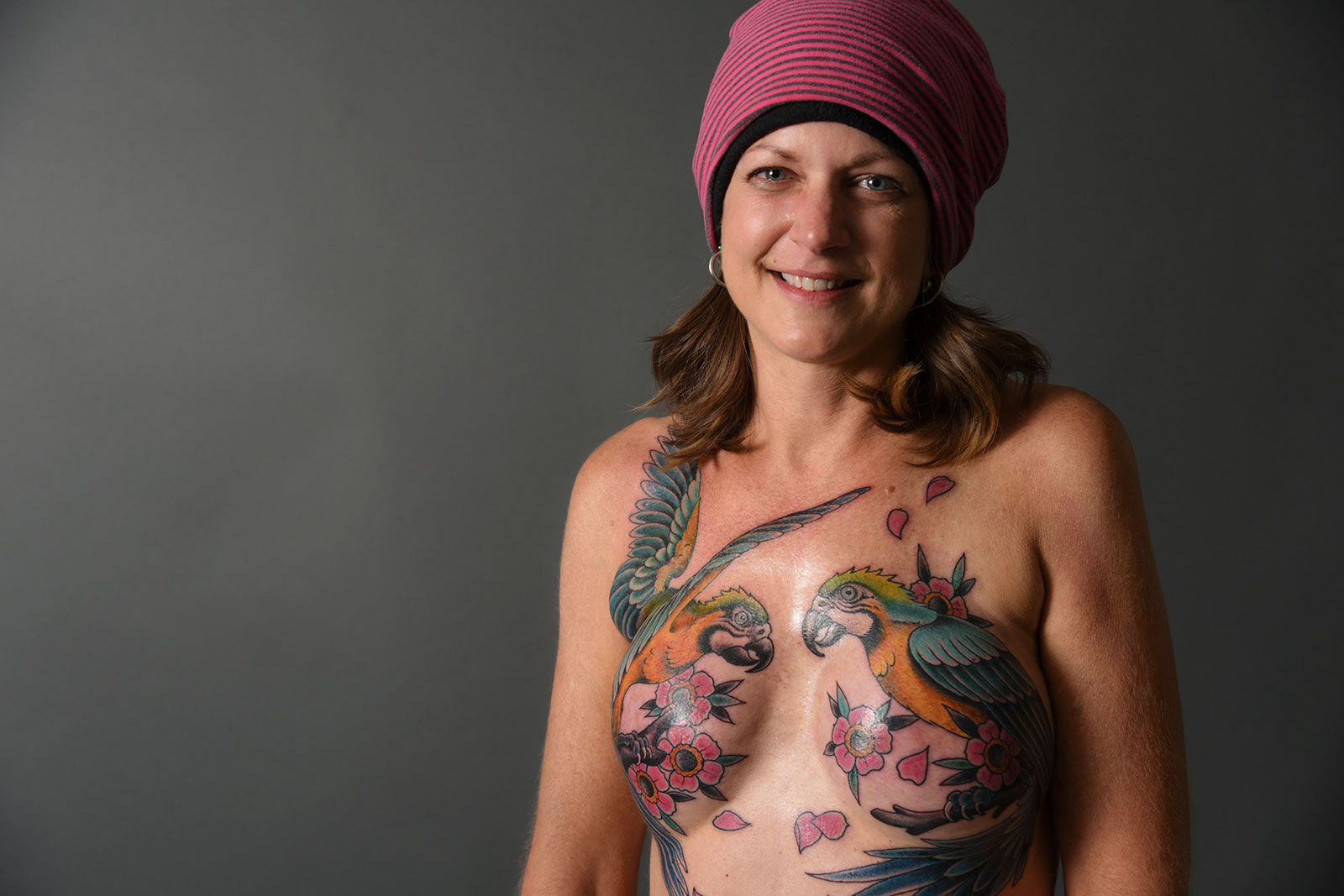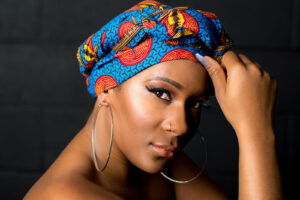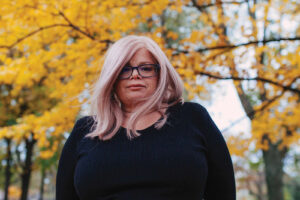For many breast cancer thrivers, the scars left behind after a mastectomy are a painful visual reminder of all they’ve been through. It can be difficult—near impossible, even—to look in the mirror or bare their scars to a partner.
Decorative mastectomy tattoos are an alternative to other post-mastectomy options such as nipple reconstruction or 3D areola tattooing. Beautiful and meaningful custom designs tattooed over mastectomy scars help women find a new sense of strength and empowerment after their experience with cancer.
Personal Ink (P.ink), a program under the nonprofit organization Fuck Cancer, helps women reclaim their bodies after mastectomies. P.ink provides information and resources for post-mastectomy tattoo options through their educational website, artist directory and annual P.ink Day events every October. At these events, breast cancer thrivers selected from an application process receive tattoos over their mastectomy scars, performed by tattoo artists donating their time and talent.
The program’s goal, says P.ink director Karen Richards, is to “use these P.ink days as a springboard to raise awareness about [mastectomy tattoos] as an alternative.” Secondly, she notes, P.ink works to provide trusted resources for people to find out more about mastectomy tattoos and find trusted artists to work with, no matter where they live.

P.ink Day events take place at tattoo shops in cities in the United States and Canada. Breast cancer survivors apply for their desired event location and provide information about their surgery, tattoo ideas and design references. Mastectomy tattoos are as unique as each recipient, and designs can vary from flora and fauna to ribbons to abstract art. Participating artists carefully review all applications to ensure that each selected tattoo recipient is matched with the artist best suited for their request.
P.ink Day events started in 2013 in New York City with 10 tattoo recipients. Over time, the event has grown and expanded to additional cities, and hundreds of breast cancer thrivers have participated. After events were cancelled in 2020, P.ink Day has returned in 2021 with more than a dozen locations throughout the month of October.
After undergoing a mastectomy in 2002, Richards was a Boulder P.ink Day tattoo recipient in 2014. The event had such a profound impact on her, she says, that she knew she wanted to get involved. She went on to become P.ink Director and local organizer for Denver P.ink Day. She works to ensure the program provides the best possible information and support for anyone interested in exploring their options with mastectomy tattoos, in addition to hosting P.ink Day events directly matching artists and tattoo recipients.
Richards’ recent work with the program has included centralizing the P.ink Day application process and transitioning from the previous waiting list-based system. In the new application process, all applicants for that year are reviewed and recipients are selected and matched with the artists at each location. Applicants who are not selected one year may choose to apply again in the future.

Richards has also compiled data from the waiting list and applications to determine geographic areas with the greatest demand. This way, the program can strategically plan P.ink Day events in cities that have demonstrated high interest. This new application process and city selection approach has helped open the program to new locations in 2021 like Austin, Charleston and Tampa Bay.
Just as applicants must provide specific details on their surgery history and design ideas, artists are carefully selected by P.ink to ensure they are a good fit for the program. Richards emphasizes that artists need to have experience tattooing skin that has undergone surgery and potentially radiation as well as surgery results like aesthetic flat closure or reconstruction with implants or autologous tissue. And just as important as this experience is the artists’ true compassion and desire to help breast cancer thrivers reconnect with their bodies. “We need to hear why they do what they do,” Richards explains of the artist selection process.
Outside of P.ink Day, thrivers can find support year-round with mastectomy tattoo information on the P.ink website. Resources include a downloadable fact sheet, tattoo FAQs and an artist directory. The program continuously seeks out tattoo artists with mastectomy experience that thrivers can contact outside of P.ink Day events. The directory can be filtered geographically for any location someone might be interested in.
P.ink organizers are delighted to resume P.ink Day this year in addition to optimizing their website and resources for anyone interested, whether they’re curious about getting a mastectomy tattoo on their own or would like to apply for a future P.ink Day. Richards says that the powerful emotional impact she experienced firsthand as a tattoo recipient is clear in each event she has witnessed in the years since. “There’s this feeling of empowerment that is just palpable. It’s really incredible,” she says.
For more information, visit p-ink.org.







